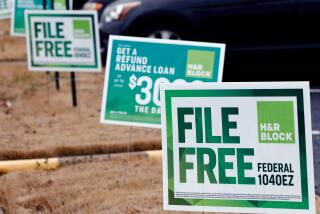Arthur Laffer wants <em>you</em> to pay online sales taxes
- Share via
Economist Arthur Laffer occupies an exalted place in Republican tax-policy circles thanks to his influential but controversial theory that some tax cuts generate more income for the Treasury. A staple in supply-siders’ policy toolbox, it helped build support for the major tax cuts under President Reagan and President George W. Bush.
So you have to wonder how House Republicans will react to Laffer’s public endorsement of the push in Congress to require online retailers to collect sales taxes even from shoppers in states where they have no physical presence. (The Senate has passed a bill to that effect, but it’s made no progress in the House.) The ringing endorsement is so counterintuitive, it’s the equivalent of former Sen. Phil Gramm (R-Texas) coming out against “sequestration” or Sen. Barbara Boxer (D-Calif.) calling for Proposition 8 to be reinstated.
Laffer hasn’t become a big-government convert. Instead, his argument hews to at least two principles that conservatives ought to embrace.
The first is that tax evasion is a bad thing, at least in part because it causes government to raise the rates on people who comply with the law.
“Despite widespread misinformation,” Laffer wrote in an op-ed in USA Today, “online sales are already subject to sales taxes.... Not collecting sales taxes, which in 2012 trimmed state revenues by more than $23 billion, results in a smaller sales tax base and an inefficient system that stifles job creation and economic growth. Instead of cutting spending in reaction to decreasing sales tax revenues, many states have raised tax rates, compounding the problem.”
The second principle is that consumption taxes are better than income taxes. That’s not just a conservative point of view. Many economists feel the same way because taxing income discourages labor and investment, which are important to economic growth. Of course, excessive sales taxes drive down the consumer spending that has become a keystone in the U.S. economy. They also inflict more pain on low-income families than high-income ones. So, as with all things, there are trade-offs.
At any rate, Laffer released a study this month of the economic effects of allowing states to require online retailers to collect sales taxes on their behalf. The study finds that by 2022, states with sales taxes would see growth rates that were 1 to 4 percentage points higher, and half a trillion dollars would be added that year to the country’s economy.
There are two very important caveats to note, however. First, the study assumes that states would offset the extra revenue from online sales taxes by lowering their income taxes or other growth-deterring levies. And second, the study was financed by the Marketplace Fairness Coalition, the trade association that’s been lobbying Congress to allow states to force online retailers to collect taxes for them.
I don’t expect Republicans to argue that Laffer’s research was skewed by its sponsors. I do, however, expect them to argue that most states won’t use the extra sales tax income to lower other taxes. And they’d probably be right about that.
Personally, I don’t think that’s a reason to continue enabling people to evade the law, to the detriment of shoppers and retailers who can’t avoid state sales taxes. But I can see why Laffer’s exhortations may find few sympathetic listeners in the House GOP.
ALSO:
Charter schools — a report card
How your cellphone betrays you
Best financial advice for McDonald’s employees: Leave
Follow Jon Healey on Twitter @jcahealey
More to Read
A cure for the common opinion
Get thought-provoking perspectives with our weekly newsletter.
You may occasionally receive promotional content from the Los Angeles Times.







